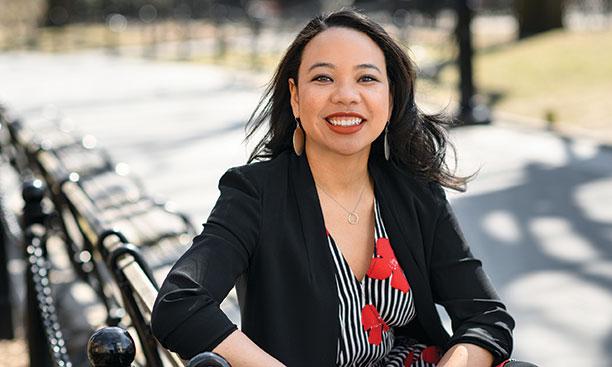
Tao Leigh Goffe ’09, an assistant professor and faculty fellow at New York University, forged her academic path when, as an English major at Princeton, she wrote a junior paper on The Pagoda by Patricia Powell. The novel, about a Chinese shopkeeper in Jamaica during the 1890s, was the first book Goffe read that explored Jamaican-Chinese history — her history. “[It] put me on that quest ... to figure out why the presence of the Chinese and of Afro-Chineseness is so obscured in the story of the Caribbean and the Americas,” says Goffe.
In 2016 that quest took her, along with her mother and sister, to a house in Hong Kong. Nervously, they knocked on the door, unsure how they would be received by the relatives inside, who had no idea they were coming.
This was the childhood home of Goffe’s maternal grandfather, Edwin Hugh, an Afro-Chinese man born in Jamaica. Edwin’s Chinese father, Hugh Yee Fatt, migrated to Jamaica in 1914, where he had several children with Afro-Jamaican women. He sent Edwin to China at age 6 to be educated and raised by his Chinese wife — a common practice among Chinese migrants in those days, when it was normal to have multiple partners. In adulthood, Edwin returned to Jamaica, married a local Afro-Chinese woman, and eventually migrated to the United States, where he died in 2003 at age 76.
Growing up in London, then New Jersey and New York, Goffe had always wondered about her grandfather’s childhood in Hong Kong. “We would hear him on the phone speaking in Cantonese,” said Goffe. “But whenever we asked about it, he never really said anything.”
The Hong Kong relatives — her mother’s first cousin and his son — were welcoming. And the Goffes were overcome when they saw photos they recognized of both Hugh Yee Fatt and Edwin.
In 2017, Goffe returned to China and tracked down Hugh Yee Fatt’s ancestral village — part of her research into her Chinese lineage. “It’s wonderful discovering roots that go thousands of years back,” she says. Goffe, whose father is black British, while her mother’s parents are both Afro-Jamaican Chinese, continues: “Being part of the black diaspora and the history of transatlantic slavery, there’s a more limited sense on [that] side of the family of where exactly we came from in Africa.”
That history, and the ways it brought Asian and African lives together, lies at the core of Goffe’s research. Goffe, who will who will be moving to a new post as an assistant professor of Africana and feminist, gender, and sexuality studies at Cornell, studies what she calls “Afro-Asian intimacies in the Americas” through the lenses of literature, food, music, photography, and gambling. Those include Ian Fleming’s novel Dr. No (of James Bond fame); beauty-pageant photography (a disproportionate number of beauty queens in Jamaica have been fully ethnic Chinese or mixed-race black and Chinese); and the reggae-music industry (a number of label executives are Chinese-Jamaican).
The Caribbean has a long history of Chinese migration — one tied to transatlantic slavery. Chinese and Indian workers were first brought to the British West Indies to replace slave labor on sugar plantations after Britain abolished slavery in 1834. From 1853 to 1884, a recorded 17,904 Chinese migrated to the British West Indies as indentured laborers. (Some 160,000 migrated to the Caribbean overall, including to Cuba.) Some remained after their contracts ended and over time became a merchant class. During the 1960s and ’70s, many left the island due to political unrest and a 1965 wave of anti-Chinese violence.
Goffe’s maternal grandmother migrated to the United States as a domestic worker after the 1965 Immigration and Nationality Act abolished the existing national-origins quota system. Goffe’s paternal grandparents, both Afro-Jamaican, migrated to England in the 1950s. Goffe believes that being a product of these diasporic networks is what makes her — and other family members — so curious about the past. Her father, Leslie Gordon Goffe, is a journalist who wrote a book about his family history, and her mother and sister co-authored a book about a prominent relative who helped develop polio and measles vaccines. Now, Goffe is writing a book she calls an “alternative archive” of Afro-Asia.
After graduating from Princeton, Goffe completed a Ph.D. in American studies at Yale, then returned to Princeton for a fellowship in the newly formed African American studies department. At NYU she teaches popular classes like “The Darker Nations: Afro-Asian Literary Cultures” and “Chinatown: Havana, Kingston, New York.”
“It can often feel like, ‘Oh, this is so narrow and only about my heritage,’ and sometimes people will criticize [it] as ‘me-search,’” she says. “But when you think about it, it’s so global. When you think about Africa and Asia, and diaspora, and identity formation and who participates in the different cultures that come out of those histories and experiences — that’s a conversation we should all be having about the intimacy of globalization. It doesn’t have to exclude anyone. It’s really about inclusiveness.”
